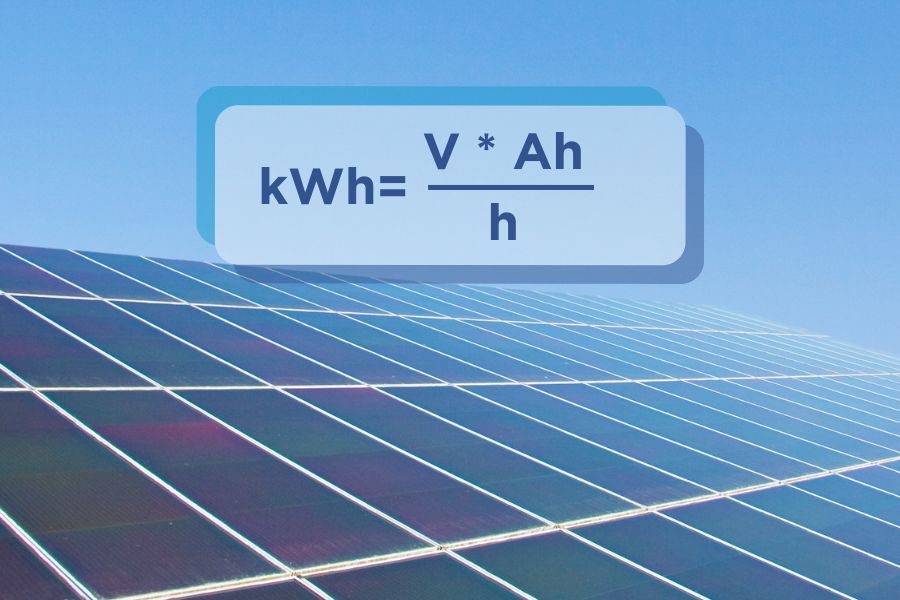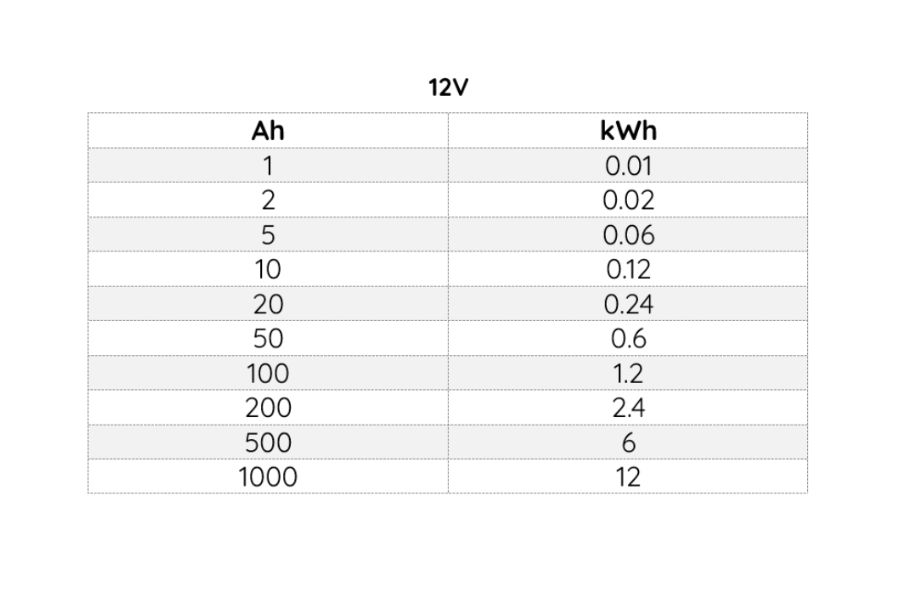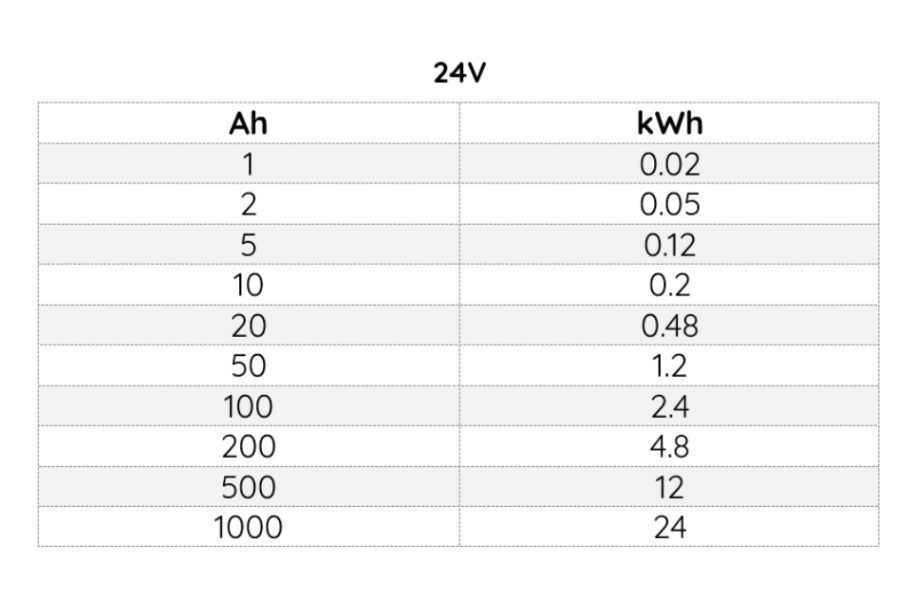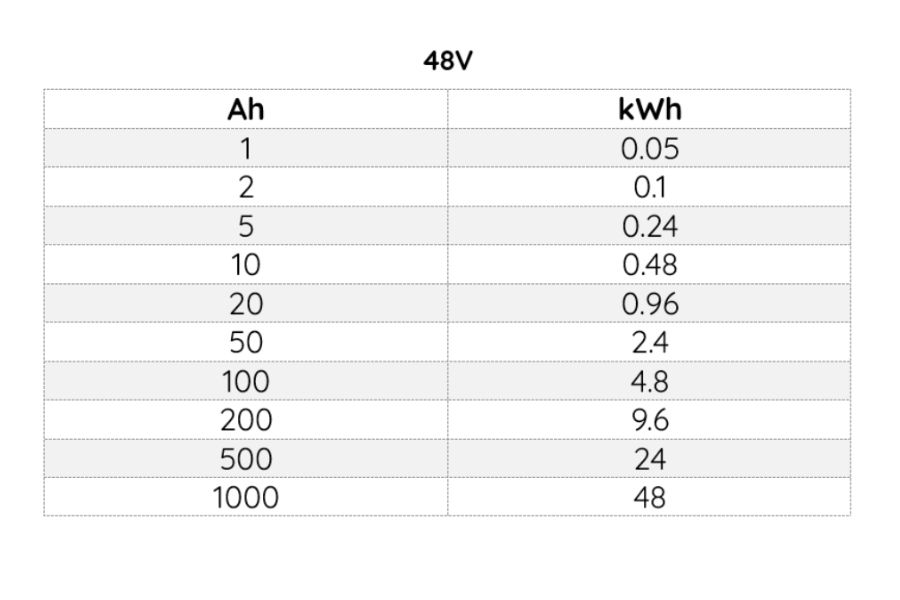Ah × V / 1000 =
0.00 kWh
Conversion formula: kWh = Ah × V / 1000
What Is Amp Hour (Ah)?
Amp-hour (also ampere-hour) is a unit derived from combining electrical current and time. It measures how much electric charge a power source can supply over one hour.
Since amp-hour is a product of electrical current (amps) and time (hours), one amp-hour equals the supply of one ampere of electric charge over one hour.
Amp-hours (Ah) is typically the unit used for battery capacity. However, alternatives like milliamp-hours (mAh), watt-hours (Wh), and kilowatt-hours (kWh) may also be used.
What Is Kilowatt-Hours (kWh)?
When you look at your energy bills, you may come across kilowatt-hours or kWh. Well, that’s because kilowatt-hours is a unit for measuring energy usage. But kilowatt-hour not only measures energy consumption, but it also measures energy stored or produced.
Kilowatt-hours represent the energy from power generated or consumed (in kilowatts) over a certain number of hours. It is a unit derived from the product of power (kilowatts) and time (hours). So, one kilowatt-hour equals the consumption or generation of one kilowatt of power over one hour.
Like ampere-hour, kilowatt-hour may be used to represent battery capacity. However, it is not as commonly used as ampere-hour.
How to Calculate Ah to kWh
Ah to kWh Conversion Formula

To convert amp-hours to kilowatt-hours, we need to show the relationship between the formula for electrical energy (kWh) and capacity (Ah). To do this, we’ll start by defining the formula for energy (in kilowatt-hour):
\(\small{electrical\ energy\ (kWh) = power\ (kW) * time\ (h)}\ (1)\)
Replacing the quantities in (1) with their units:
\(kWh = kW * h\ (2)\)
Since:
\(kW=\displaystyle{\frac{V*A}{1000}}\ (3)\)
We can rewrite (2) as:
\(kWh=\displaystyle{\frac{V*A}{1000}} * h\)
\(kWh=\displaystyle{\frac{V*A*h}{1000}}\)
\(kWh=\displaystyle{\frac{V*Ah}{1000}}\ (4)\)
We have our ampere-hours to kilowatt-hour (Ah to kWh) conversion formula in (4). Going by that formula, an Ah to kWh conversion calculator does its by multiplying ampere-hour (Ah) and voltage (V) before dividing their product by 1000.
Example 1:
Suppose you have a solar panel system with a 100 amp-hours (Ah), 20V lead-acid battery. What’s the total kilowatt-hour the battery can store?
Solving this is pretty easy. All we have to do is multiply 100 by 20, then divide by 1000:
\(kWh=\displaystyle{\frac{20*100}{1000}} = 2\ kWh\)
The battery’s capacity in kWh is 2 kWh.
Example 2:
A solar-powered air conditioner is connected to a 48V, 400 Ah battery. What’s the battery’s rating in kWh?
Like the previous example, this is also straightforward. All we have to do is multiply 48 and 400, then divide by 1000:
\(kWh=\displaystyle{\frac{48*400}{1000}} = 19.2\ kWh\)
How to Convert Milliamp Hours to Kilowatt Hours (mAh to kWh)
As stated before, milliamp-hours (mAh) is sometimes used to measure a battery’s capacity. So, what if you have a battery whose capacity is in mAh, and you want to do a mAh to kWh conversion?
Doing a mAh to kWh conversion is as simple as doing an Ah to kWh conversion. In fact, we can derive the mAh to kWh formula from the Ah to kWh conversion.
Recalling the formula to convert ampere-hours to kilowatt-hours:
\(kWh=\displaystyle{\frac{V*Ah}{1000}}
To get the mAh to kWh conversion, we must replace Ah with mAh in the above formula. We’ll do it the same way as an mA to A conversion calculator does, applying the same principle of scaling by a factor of 1,000.
Since:
[latex]Ah=\displaystyle{\frac{mAh}{1000}}\)
We can replace Ah with mAh/1000 in the Ah to kWh conversion formula:
\(kWh=\displaystyle{\frac{V*mAh}{1,000,000}}\)
Using the formula above, we can convert mAh to kWh by multiplying mAh by volts and dividing by one million.
Example:
If you have a portable power station rated 80,000 mAh, 24V, its capacity in kilowatt-hours would be:
\(kWh=\displaystyle{\frac{24*80,000}{1,000,000}} = 1.92\ kWh\)
Reasons to Convert Amp-Hours to Kilowatt Hours (Ah to kWh)?
Deducing Battery Size for Energy Needs
When trying to deduce the battery capacity that will meet your energy needs, you can do a kWh to Ah conversion. Alternatively, you can figure the same out with an Ah to kWh conversion calculator.
With an amp-hour to kilowatt-hour (Ah to kWh) conversion calculator, you’d be trying to determine the total energy your battery can offer. But with a kWh to Ah conversion calculator, you’d estimate the electric charge needed to meet your energy needs. In either case, your estimation would not be far off.
Comparing Batteries
We can work with their values in ampere-hours when comparing batteries to see which has a larger capacity. However, if the batteries being compared have different voltages, comparing them with their ampere-hours would be inaccurate. This holds because voltage factors into the amount of electrical energy stored in a battery.
When we want to compare the capacity of batteries with different voltages, we’ll need an Ah to kWh conversion calculator.
Example:
You have three batteries rated 50Ah, 24V; 60Ah, 12V; and 50Ah, 48V. If we pay attention to just the ampere-hours of these batteries, it may seem like the 60Ah battery has the highest capacity. But it has the lowest.
Still, judging by their ampere-hours, it may seem like the two 50Ah batteries have the same capacity. However, they don’t.
So, how can we tell which has the highest capacity? We’ll use an Ah to kWh calculator. If you enter each battery’s amp-hours and voltage values in our Ah to kWh calculator, you’ll get the following results: 1.2 kWh, 0.72 kWh, and 2.4 kWh, respectively.
This shows that, contrary to the amp-hours value, the last battery has the largest capacity while the middle battery has the lowest capacity.
Amp Hours to Kilowatt Hours Conversion Chart
When an amp-hour to kilowatt-hour calculator isn’t readily available, the following charts may come in handy for quick conversions:



Watt Hours vs. Kilowatt Hours (Wh vs kWh)
Watt-hours and kilowatt-hours are both derived units typically used to measure electrical energy. However, one big difference between them is the magnitude in which they measure.
While watt-hour measures in multiples of one, kilowatt-hour measures in multiples of thousands. By this, the energy measured in kilowatt-hours is larger than in watt-hours. In other words, one kilowatt-hour is greater than one watt-hour by a thousand times.

